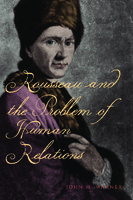Rousseau and the Problem of Human Relations
Author(s)
Warner, John M.
Collection
Knowledge Unlatched (KU)Number
103482Language
EnglishAbstract
Among Jean-Jacques Rousseau’s chief preoccupations was the problem of self-interest implicit in all social relationships. A person with divided loyalties (i.e., to both himself and his cohorts) was, in Rousseau’s thinking, a divided person. According to John Warner’s Rousseau and the Problem of Human Relations, not only did Rousseau never solve this problem, he believed it was fundamentally unsolvable: social relationships could never restore wholeness to a self-interested human being. Warner traces his argument through the contours of Rousseau’s thought on three distinct types of relationships—sexual love, friendship, and civil or political association. Warner concludes that none of these, whether examined individually or together, provides a satisfactory resolution to the problem of human dividedness located at the center of Rousseau’s thinking.
Keywords
Political Science; philosophy; politics; politics and social views; interpersonal relations; Amour-propre; Emile; or On Education; Jean-Jacques Rousseau; Thomas HobbesDOI
10.26530/OAPEN_605032ISBN
9780271074641OCN
1038389933Publisher
Penn State University PressPublisher website
http://www.psupress.org/Publication date and place
University Park, 2018Classification
Social and political philosophy


 Download
Download Web Shop
Web Shop